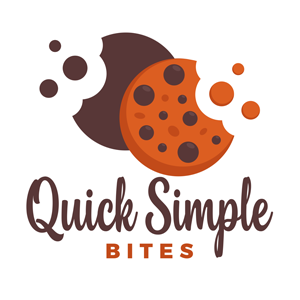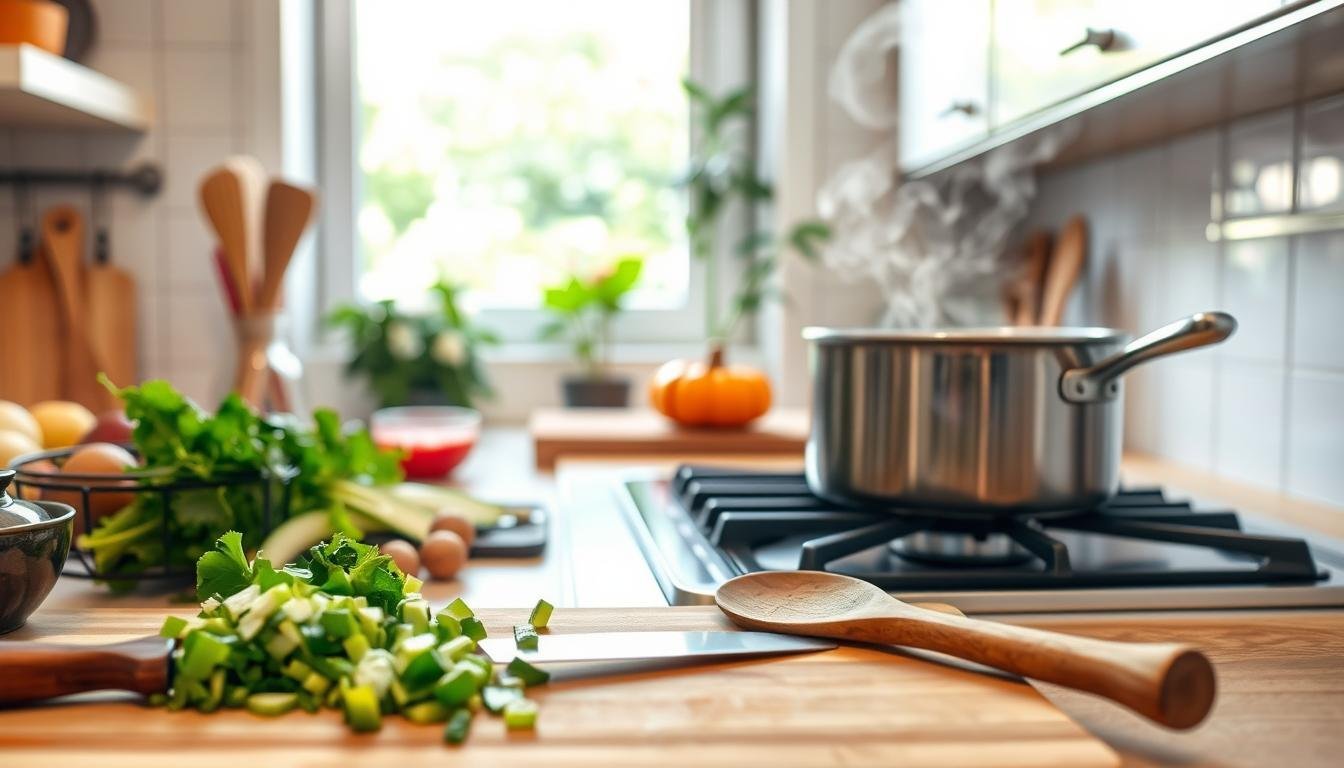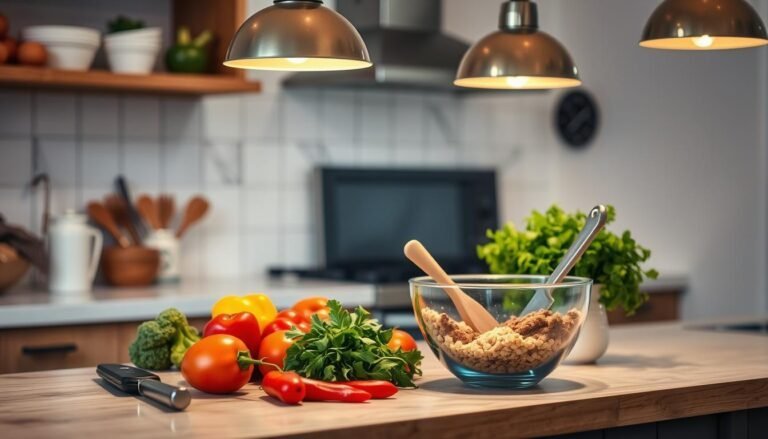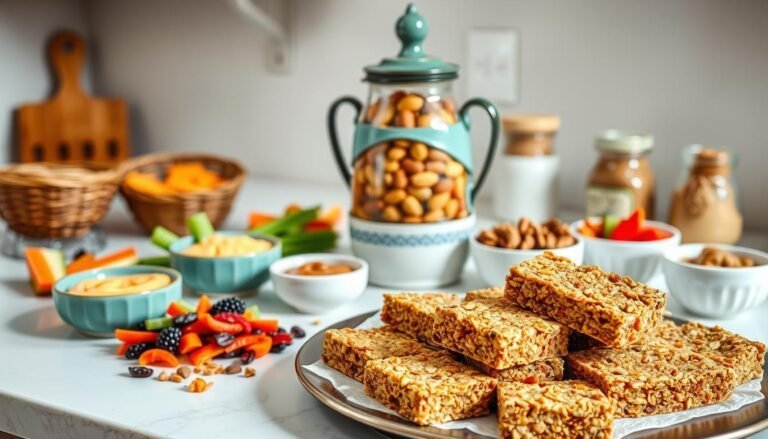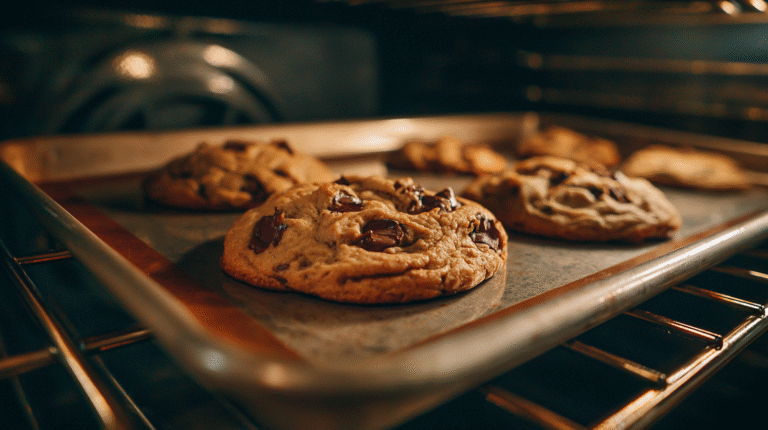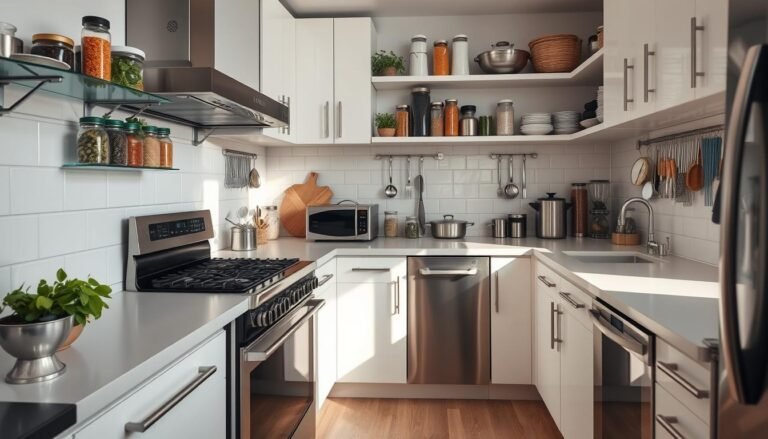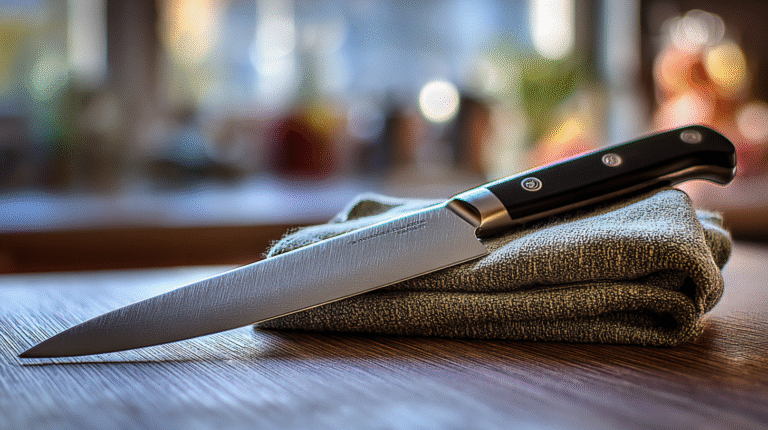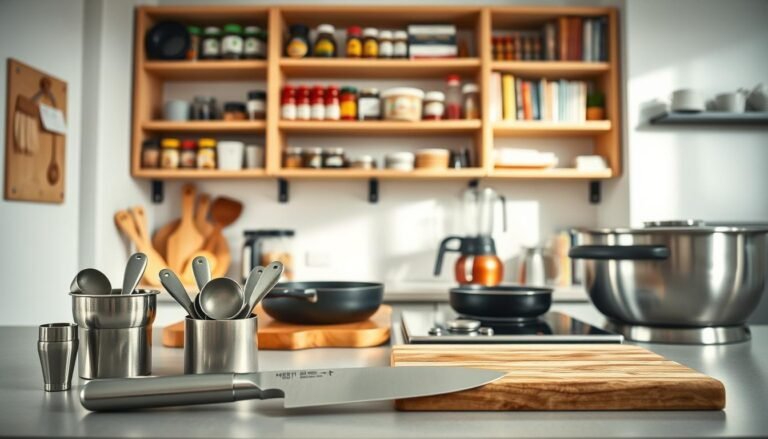Disclosure: This Post Contains Affiliate Links; We earn a commission on purchases.
Starting a cooking journey is both thrilling and scary, mainly for newbies in the kitchen. Many beginner cooks deal with issues like meal planning and following recipes with ease. Ross Yoder says, if you’re stuck, asking for help is key to becoming good at cooking.
At our beginner cooking blog, we’re here to guide and support you. This article tackles common problems for new cooks. It gives tips on where to begin and how to improve your cooking skills.
Key Takeaways
- Understanding the basics of meal planning
- Learning to execute simple recipes with confidence
- Identifying resources for further learning and support
- Building a kitchen toolkit for beginners
- Exploring beginner-friendly cooking techniques
The Beginner’s Mindset: Overcoming Kitchen Anxiety
Kitchen anxiety is common for new cooks. But, practice and patience can help. Remember, cooking is a skill that grows with time.
Why Cooking Feels Overwhelming
Cooking can feel scary because of all the techniques, ingredients, and tools. Start with simple recipes and slowly learn more. You can find beginner-friendly recipes on Lemon8.
Setting Realistic Expectations
Start with easy dishes and then try harder ones. This way, you build confidence and skills.
Embracing the Learning Process
Learning to cook is a journey. Remember, even pros started from scratch. A positive attitude makes cooking fun and rewarding.
Essential Kitchen Tools for Beginners
The right kitchen tools are key for beginners to feel confident and skilled in cooking. Having the basics can greatly improve your cooking experience. It makes cooking more fun and less scary.
Must-Have Utensils and Equipment
The NEAT Method Kitchen says a few essential tools are all you need to start. You’ll need a stovetop, cutting board, knife, and iron skillet. These tools are basic because they meet your cooking needs.
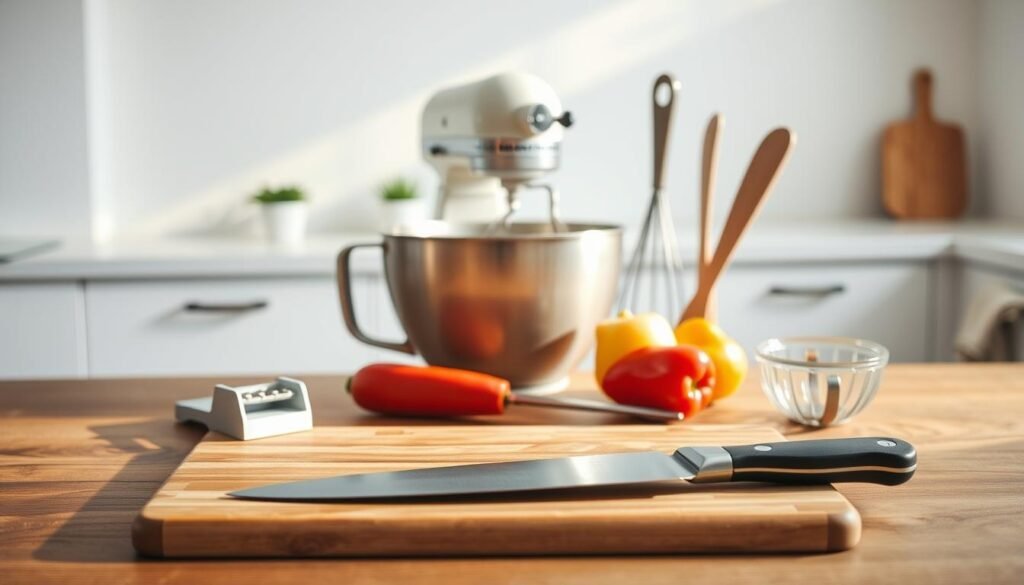
Budget-Friendly Alternatives
Not everyone can buy expensive kitchen tools right away. Luckily, there are affordable options that are good quality but cheaper. Beginners can find tools that are durable and can do many things.
Tools to Avoid Until You’re More Experienced
It’s tempting to buy every gadget, but beginners should stick to the basics. Tools like special cooking gadgets can wait until you’re more confident in your cooking.
By starting with the right tools and adding more as you go, you’ll become a great cook.
Understanding Basic Cooking Techniques
To cook with confidence, you need to know the basics. These techniques are the building blocks of cooking skills. They help beginners tackle many recipes easily.
Mastering Heat Control
Controlling heat is key in cooking. It’s about knowing how to adjust the heat to get the right result. Chef Tim says to get a meat thermometer for safe and precise cooking, mainly for meats.
- Get to know your stovetop: Learn how to adjust the heat on your stovetop.
- Choose the right cookware: Different materials heat up differently. For example, cast iron keeps heat well, while stainless steel heats up fast.
Knife Skills for Beginners
Knife skills are vital for any cook. Chef Jason recommends using a sharp knife. A sharp knife is safer because it needs less force and is more reliable.
- Know your knives: Learn about the different types of knives and their uses.
- Practice the right way: Learn how to hold the knife and chop efficiently.
Timing and Multitasking in the Kitchen
Timing and multitasking are important for making complex meals. Beginners should:
- Plan recipes: Know the cooking time for each part of a meal.
- Learn to multitask: Practice doing several things at once, like cooking and seasoning.
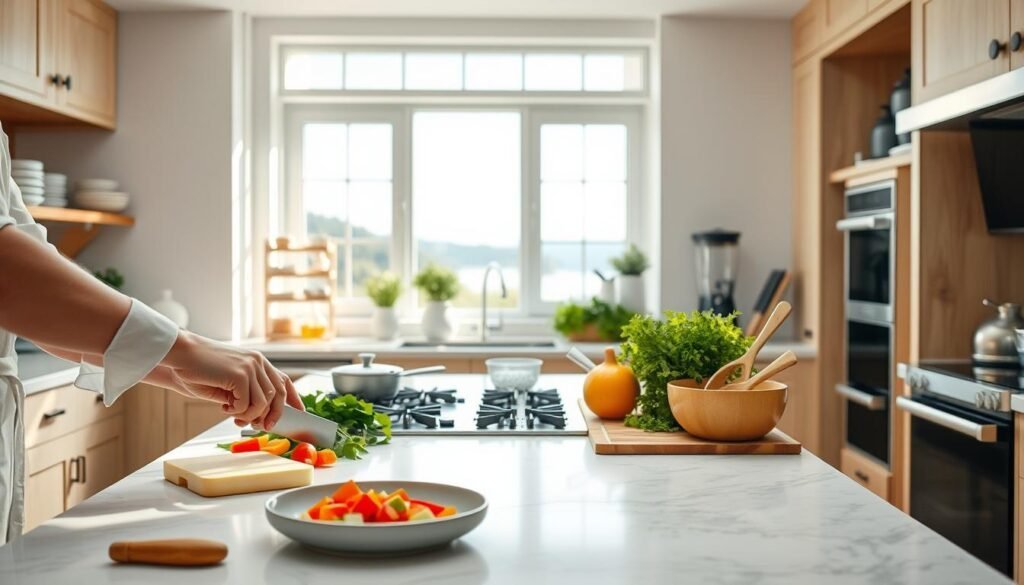
Mastering these basic techniques can greatly improve your cooking. It makes cooking more fun and less scary.
Solving Common Beginner Cooking Problems: Where to Start
Many beginner cooks face common cooking issues. Finding the root cause is the first step to solving them. Whether it’s overcooked meals, underseasoned dishes, or kitchen mishaps, knowing the problem is key to getting better.
Identifying Your Specific Challenges
The first step is to know what challenges you face. Think about your cooking experiences. Are you struggling with techniques, picking ingredients, or planning meals? Write down the issues you’re having to focus on what needs work.
Building a Foundation of Basic Skills
After knowing your challenges, focus on basic cooking skills. Learn about heat control, knife skills, and meal prep. These skills will help you with more complex recipes and avoid common mistakes.
Step-by-Step Problem-Solving Approach
Use a step-by-step method to solve cooking problems. This means figuring out what went wrong and improving little by little.
Analyzing What Went Wrong
If a dish doesn’t work out, figure out why. Was it wrong ingredient amounts, cooking time, or seasoning? Knowing the cause helps you fix it next time.
Making Incremental Improvements
Improving little by little is important. Start with small changes in recipes and techniques. This way, you build confidence and avoid common mistakes.
Recipe Disasters: Common Mistakes and Fixes
Cooking can be tricky for beginners. Even simple recipes can go wrong. Knowing common mistakes and how to fix them helps improve your cooking.
Underseasoned or Overseasoned Food
Seasoning is a big issue in cooking. The NEAT Method Kitchen advises tasting and adjusting seasoning as you cook. This simple step greatly improves your dish’s flavor.
- Taste your food at different stages of cooking.
- Adjust seasoning as needed, using salt, herbs, or spices.
- Be careful with salty ingredients like soy sauce or broth, adding salt sparingly.
Overcooked or Undercooked Dishes
Cooking time and temperature are key. Using a timer and thermometer helps avoid overcooking or undercooking. Knowing your cooking method and ingredients is also important.
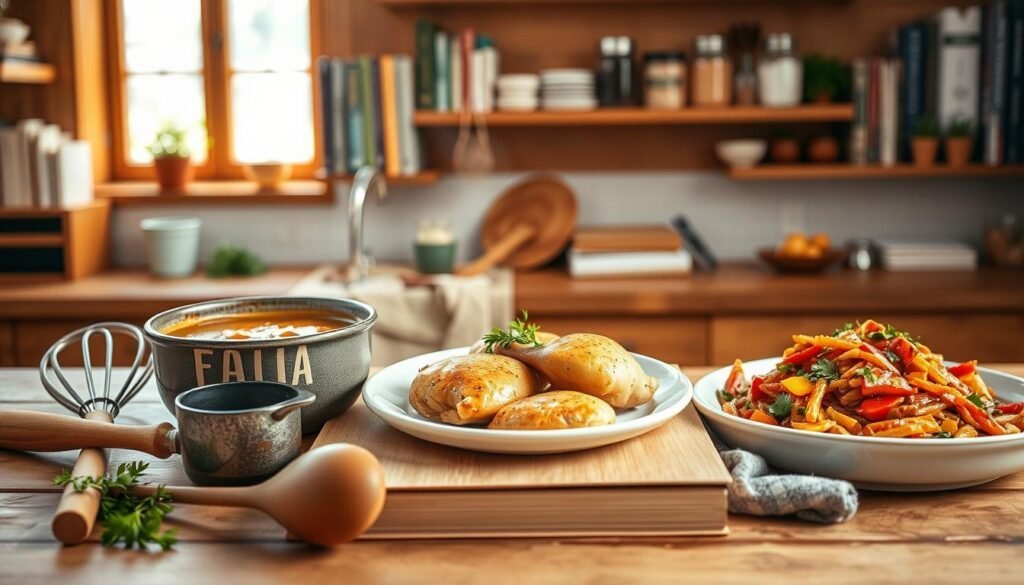
Texture Problems and Solutions
Texture issues come from overcooking or wrong preparation. Overcooking pasta or veggies makes them too soft. To fix this, watch cooking times closely and use blanching to keep texture.
Salvaging Kitchen Mishaps
Not every dish turns out right, but many can be saved. If a dish is too salty, adding dairy or a sweet element can help. The key is to stay calm and think creatively.
By learning from common mistakes, beginners can get better at cooking. Start with easy recipes to build confidence in the kitchen.
Ingredient Selection and Substitutions
Choosing the right ingredients is key for cooking for beginners. It’s a skill every beginner should learn. The quality and type of ingredients greatly affect a dish’s outcome.
How to Choose Quality Ingredients
Choosing quality ingredients means knowing what makes an ingredient fresh. For veggies and fruits, pick ones with bright colors and no signs of mold. Health.com says picking whole foods like fresh fruits and veggies is both cheap and healthy.
For proteins and dairy, freshness is important. Check expiration dates and look for products stored well. For pantry items, choose whole grains over refined ones for better health.
Common Ingredient Substitutions
Recipes sometimes ask for ingredients you don’t have or want to swap for health reasons. Knowing common substitutions is key. For example, Greek yogurt can replace sour cream, and applesauce can stand in for oil in baked goods.
- Substitute almond milk or another non-dairy milk for regular milk.
- Use gluten-free flours for those with gluten intolerance.
- Replace butter with olive oil or other healthier oils when possible.
Understanding Flavor Profiles
Flavor profiles are vital in cooking as they shape a dish’s taste. Knowing how different ingredients affect flavor helps with substitutions and seasoning. For example, if a recipe calls for honey, maple syrup can be a sweet substitute.
Trying out herbs and spices can also boost your dish’s flavor. For cooking for beginners, start with simple mixes like salt, pepper, and garlic. It can make a big difference.
Meal Planning for Beginners
Meal planning for beginners is easy. It’s about making simple choices. Planning your meals helps reduce waste, saves time, and makes cooking less stressful.
Simple Weekly Planning Strategies
Start by planning meals using what you already have. The NEAT Method Kitchen suggests this. It cuts down on waste and saves time.
Building a Versatile Pantry
A good pantry is key for easy meal planning. Stock up on grains, canned goods, and spices.
Batch Cooking and Leftovers Management
Batch cooking is a big help for beginners. It lets you cook many meals at once. This saves time during the week.
Time-Saving Preparation Techniques
Methods like prep-ahead, slow cooking, and one-pot meals save time. They make meal planning more efficient.
Conclusion: Your Cooking Journey Begins Now
Starting to cook can feel scary, but it’s doable. With the right attitude and tools, anyone can cook with confidence. Learning basic cooking skills, knowing what tools you need, and planning meals can help beginners.
Ross Yoder says to ask for help if you’re stuck. He reminds us that the cooking world is full of support. As you cook more, remember that making mistakes is part of learning. They help you get better.
Now that you know more, it’s time to start cooking. Try new recipes, mix up flavors, and enjoy making food for yourself and others. Happy cooking!
FAQ
What are the most essential kitchen tools for a beginner?
How do I overcome kitchen anxiety and become a confident cook?
What are some common beginner cooking mistakes and how can I avoid them?
How do I choose the right ingredients for a recipe?
What are some simple meal planning strategies for beginners?
How can I improve my knife skills and become more efficient in the kitchen?
What are some budget-friendly alternatives to expensive kitchen tools?
How do I salvage a kitchen mishap, such as an overcooked or underseasoned dish?

With a passion for making good food easy, Ryan focuses on tips, tricks, and approachable advice for anyone who wants to eat well without spending hours in the kitchen. Whether you’re prepping lunchboxes, feeding a busy family, or just need something tasty in a pinch, Ryan’s here to help you keep it quick and simple—one bite at a time.
Subscribe to Our Newsletter
